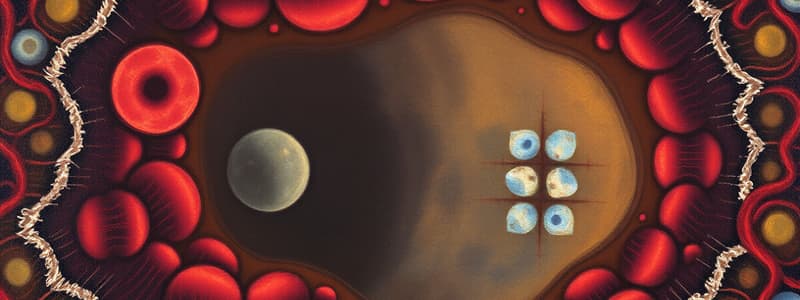Podcast
Questions and Answers
Which scientist is credited with the term 'cells' when observing cork?
Which scientist is credited with the term 'cells' when observing cork?
- Matthias Schleiden
- Robert Hooke (correct)
- Theodor Schwann
- Anton van Leeuwenhoek
What principle of the cell theory states that cells only come from other cells?
What principle of the cell theory states that cells only come from other cells?
- Cells can exist in isolation
- Cells are the basic unit of life
- Cells arise from pre-existing cells (correct)
- All living organisms are made of cells
What is a key characteristic that differentiates prokaryotic cells from eukaryotic cells?
What is a key characteristic that differentiates prokaryotic cells from eukaryotic cells?
- Cell wall composition
- Size of the cells
- Method of reproduction
- Presence of a nucleus (correct)
Which of the following organelles is primarily involved in energy production within the cell?
Which of the following organelles is primarily involved in energy production within the cell?
Which of the following is a structure found in plant cells but not in animal cells?
Which of the following is a structure found in plant cells but not in animal cells?
What aspect of life is mainly sustained by cellular processes?
What aspect of life is mainly sustained by cellular processes?
Which statement best reflects the significance of cells as the basic unit of life?
Which statement best reflects the significance of cells as the basic unit of life?
Who concluded that plants are made of cells?
Who concluded that plants are made of cells?
What structure acts as the selective barrier regulating the entry and exit of substances in a cell?
What structure acts as the selective barrier regulating the entry and exit of substances in a cell?
Which of the following correctly describes prokaryotic cells?
Which of the following correctly describes prokaryotic cells?
What is the primary function of the nucleolus within the nucleus?
What is the primary function of the nucleolus within the nucleus?
How are cells organized in the body according to the cellular hierarchy?
How are cells organized in the body according to the cellular hierarchy?
What type of organisms are prokaryotes primarily represented by?
What type of organisms are prokaryotes primarily represented by?
Which component of a eukaryotic cell is responsible for storing the cell's hereditary information?
Which component of a eukaryotic cell is responsible for storing the cell's hereditary information?
What fundamental feature do all cells share?
What fundamental feature do all cells share?
In which level of cellular organization do groups of similar cells work together to perform specific functions?
In which level of cellular organization do groups of similar cells work together to perform specific functions?
Study Notes
Biochemistry Overview
- Biochemistry studies chemical processes and substances within living organisms.
- Fundamental for understanding cellular structures and functions at the molecular level.
- Cells are central to biochemistry as they manage essential biochemical activities.
The Cell: The Foundation of Life
- Cells are the basic units of life, found in all organisms from bacteria to animals.
- Essential processes necessary for life are carried out within these cells.
Learning Objectives
- Recognize key scientists in cell discovery.
- Understand cell theory principles.
- Explain the cell's role as the basic unit of life.
- Identify and describe main cell parts.
- Compare prokaryotic and eukaryotic cells.
- Understand cellular organization into tissues, organs, and systems.
- Explore cell organelle functions, especially mitochondria.
- Identify structures exclusive to plant cells.
History of Cell Biology
- Cells were unknown before the 17th century; the microscope facilitated their discovery.
- Anton van Leeuwenhoek: First to observe microscopic organisms.
- Robert Hooke (1665): Coined "cells" after observing cork's tiny compartments.
- Matthias Schleiden (1838): Declared plants are composed of cells.
- Theodor Schwann (1839): Stated animals are also made of cells.
- Rudolf Virchow (1855): Proposed that all cells arise from pre-existing cells, forming the modern cell theory.
Introduction to Cells
- Over 200 cell types identified in the human body.
- All cells share key features: plasma membrane, cytoplasm, and nucleus.
Basic Parts of a Cell
- Plasma Membrane:
- Acts as a selective barrier made of a phospholipid bilayer with proteins.
- Cytoplasm:
- Jelly-like fluid containing cytosol and organelles performing specialized functions.
- Nucleus:
- Control center containing DNA; organized into chromatin and chromosomes.
Prokaryotic vs Eukaryotic Cells
- Prokaryotic Cells:
- Lack a nucleus; genetic material in nucleoid; includes bacteria and archaea.
- Eukaryotic Cells:
- Contain a true nucleus and membrane-bound organelles; found in plants, animals, fungi, and protists.
Cellular Organization
- Organized into a hierarchy from cells to organ systems:
- Cellular Level: Basic life unit (e.g., squamous cells).
- Tissue Level: Group of similar cells (e.g., epithelial tissue).
- Organ Level: Tissues combine to form organs (e.g., skin).
- Organ System Level: Organs work together (e.g., integumentary system).
Cell Organelles and Features
- Plasma Membrane:
- Selectively permeable barrier composed of hydrophilic and hydrophobic components.
Studying That Suits You
Use AI to generate personalized quizzes and flashcards to suit your learning preferences.
Description
Test your knowledge on the fundamental concepts of cells and their parts. This quiz covers various types of cells, their structures, and functions essential to understanding biology. Ideal for students studying cell biology and related topics.




